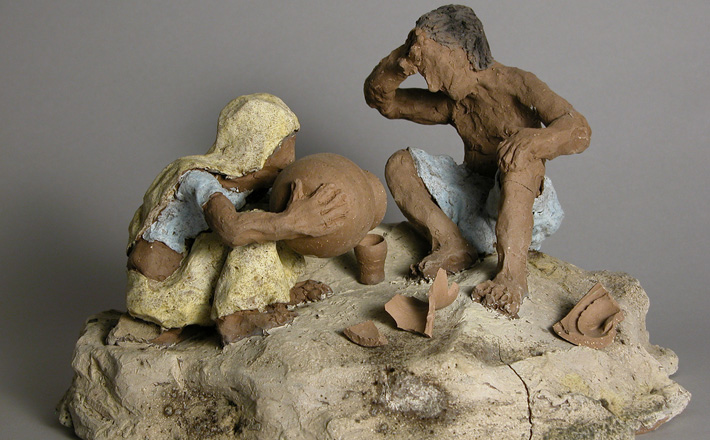Commentary on Luke 13:1-9
Trying to interpret the times theologically can often be off the mark.
Prior to this incident and parable — just a few verses earlier — Jesus spoke to crowds following him, telling them that they are good about interpreting the weather, and then asked them, “Why do you not know how to interpret the present time?” (Luke 12:56).
Some in the crowd quickly rose to the occasion, stating a case of unjust suffering with the implication that Jesus should interpret its meaning. They told him about some Galileans that Pontius Pilate had murdered in a ghastly event. No question is stated explicitly, but a question is surely implied. What is one to make of that? Did those Galileans deserve it? Was Pilate the instrument of divine judgment against them and consequent punishment?
Those who raise the implied question can hardly be faulted. They represent the usual, or at least a familiar, point of view that says: There is a reason for human suffering, and it usually has to do with something in the past of a person’s life, something that is evil.
The assumption is that we live in a universe of rewards and punishments. That way of thinking is reflected within the Bible itself. The book of Job is a particularly eloquent case. Job suffered severe losses (family, property, and health), and he carried on a long verbal interchange with three friends (Job 3-28). According to Job’s friends, he must have done something wrong to deserve his suffering. Against them, Job claims that he is innocent.
Within the New Testament, the disciples of Jesus ask him, when they encountered a blind man, “Rabbi, who sinned, this man or his parents that he was born blind?” (John 9:2). Jesus replied that neither the man nor his parents had sinned so as to cause the blindness.
The implied question is met head-on by Jesus. He declares that the Galileans who suffered were no worse sinners than anyone else. And he adds to their illustration one of his own. He refers to an accident in Jerusalem. Eighteen persons died when a tower fell on them. Those persons were no worse than anyone else. The accident was random. Anyone happening to be at the wrong place at the wrong time can be the victim of an accident.
The question of the justice of God (theodicy) persists into the present day. To think that human suffering is due to divine punishment for sin, or perhaps to some unknown flaw or secret misdeed, is too simple, but familiar. In fact, it is one of the most widely held “theological propositions” that exists in popular thinking by persons who would not regard themselves as theologians per se, but as believers in any case. It is the quick remedy to explain illness and death.
Of course we know that there are cases where cause and effect can be established between risky behaviors and their consequences. Within the Bible itself there are passages that speak of sin leading to divine punishment (Exodus 15:26; 20:5; Psalm 107:17; Jeremiah 31:30). That’s fair enough. But that is not the issue in all cases. The idea that suffering in general is due to personal sinful deeds is the issue that needs to be addressed. There, as in the case of Job and in the teachings of Jesus, the idea does not hold up.
The interchange between Jesus and his hearers concerning the Galileans and the victims of the tower’s falling (which, by the way, are incidents otherwise unknown in ancient sources) are occasions for Jesus to make a point. The sentences in 13:3 and 13:5 are virtually identical: “No, I tell you, but unless you repent, you will all perish as they did.”
Jesus does not make a well-worked out analogy. He does not say: “Just as innocent people suffer randomly, as in the two cases mentioned, so you, though innocent, can expect to suffer too.” Rather, he takes the occasion of two local stories about human tragedy to speak about another tragedy that could happen, unless things change. In other words, the interchange concerning two local tragedies, commonly thought to indicate divine judgment, however wrong, becomes a teaching moment. It triggers an opportunity to speak of actual judgment.
The Parable of the Barren Fig Tree that follows carries forward the message of judgment, but ends upon a note of grace. This time the dialogue is between a landowner and the man whom he has hired to be its caretaker. The landowner had planted a fig tree in his vineyard, and he figured that it was about time to gather figs from it. But taking a look, he found that the tree was barren. As a good steward of his land and crops, the land owner concludes that there are two problems at hand: (1) the tree is worthless, because it is barren for a third year in a row, and (2) it is taking up space that could otherwise be productive in the vineyard. It is time to cut it down.
The caretaker pleads for patience. Give it another year, he says. In the meantime he will loosen the soil around it and add fertilizer. It might still produce fruit in another year, and that would be good. There would be no need to replace the tree with another. And think of it: if the tree is replaced by another, the new tree would need several years to produce fruit. There is good reason to give this tree another chance. On the other hand, if it does not produce fruit in another year, then it can be cut down.
The implication to be drawn from the parable is that God is patient, which gives Jesus’ hearers time for repentance, but there is a limit.
The parable helps place God’s judgment and grace into a larger perspective. In the larger scheme of things, God’s grace is greater than God’s judgment. How could it be otherwise? Divine patience is simply another expression of God’s love and grace. But God’s grace is not to be understood as casual indulgence or indifference.
The apostle Paul put it this way: “Do you not realize that God’s kindness is meant to lead you to repentance? But by your hard and impenitent heart you are storing up wrath for yourself on the day of wrath, when God’s righteous judgment will be revealed” (Romans 2:4-5). Those who do not take the opportunity offered to repent can lose out in the end. As the caretaker puts it to the landowner, if the fig tree does not bear fruit in another year, go ahead and cut it down.
Taking into consideration the larger biblical witness, the life of the disciple of Jesus is to consist of daily repentance and renewal. Each day is a day of grace, providing the opportunity to repent — and then to bear fruits of repentance (Luke 3:8). Within the context of our pericope, those “fruits” are good deeds. Here there are endless possibilities. One cannot prescribe what they will be for all time prior to any particular situation; that would close down the limitless range of acts that people do in their own times and places. Nevertheless, they will be shaped by what Paul calls “the fruit of the Spirit,” which includes love, peace, patience, kindness, generosity, and more (Galatians 5:22-23).


March 3, 2013